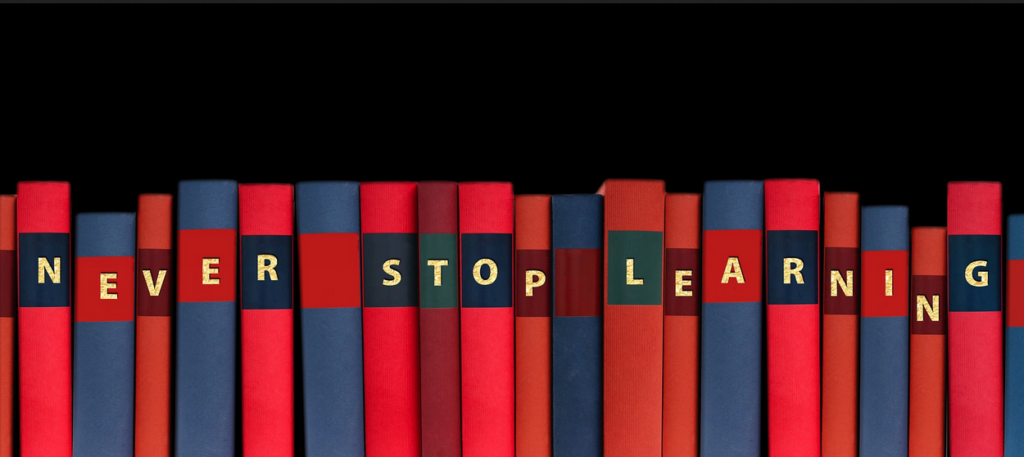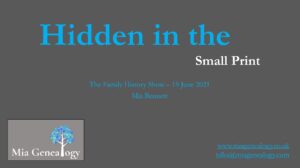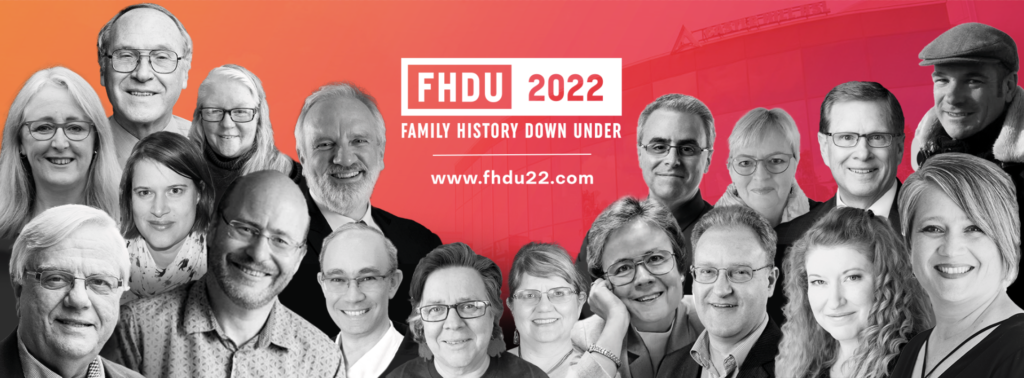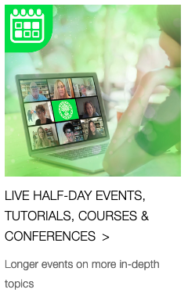Enhancing your genealogy education.
By Mia Bennett.
Genealogy education is a wonderful thing. It is one thing that has been enhanced by the disruption we have had through Covid. In the past, the majority of genealogy education was in-person so we were restricted to local events or accepting the cost (in time and money) to travel to an event. The advent of online events has opened up genealogy education across the world. However, there are things that can only be gained by meeting in person and it is welcome that those events are now happening again. This blog is my personal experience and hopefully gives ideas of how we can maximise the benefits of all the different types of genealogy education.

Never Stop Learning. Image by Gerd Altmann from Pixabay’
Starting with the online world, we now have a large amount of choices when it comes to where we can access talks and courses. Local family history societies have made the journey online at varying pace – some embraced it early on, some took a little longer but have now got into the swing of regular talks, while some have not had the capacity to expand online and hence are now grateful for the return to in-person events. Hopefully everyone has been continuing to support their local family history societies but we can now access the talks from those societies that represent the locations our ancestors come from. My local FHS is Gloucestershire and, although they took a little time to start using Zoom, they now do monthly online talks. What’s more they decided to make them accessible to all and not just members so anyone can sign up for them (https://gfhs.org.uk/about-us/society-events/). For members, recordings of some of the talks are available on the website. Often the talks from FHSs are specific to the local area however it has also allowed speakers from further afield to speak on any number of topics. I have enjoyed visiting other FHS around the world (while sitting in my office) to give talks during the past couple of years. Check out the FHS local to your ancestors’ original parishes in case there are talks relevant to you.

Hidden in the Small Print talk cover.
Another source for online talks is Legacy Family Tree Webinars (https://familytreewebinars.com/). Although they are based in the USA, that have speakers from around the world and have a regular Down Under series of webinars. The majority of webinars are available free for the first 7 days but if you subscribe the talks remain available (normally forever) and you can access the accompanying handout (often these are treasures of useful information in themselves). There is a fee to join but they often give a discounted rate – but even at full price the value is well worth it.
Online conferences have been another source – I was involved in one such one in the UK very early on in April 2020. Given how new online conferences were, it worked well and was great to see other people’s talks particularly when they would normally have clashed with giving my own talk, working on a stall or giving advice if it had been an in-person event. There are many more now – RootsTech Connect (https://www.familysearch.org/rootstech/home) is by far the biggest and the content remains online. I did a short talk on occupations for the 2021 event and, although it is no longer linked via their website, you can still access it on YouTube (https://www.youtube.com/watch?v=cYuQvmMelcQ). In Australia, Family History Down Under 2021 provided access to extensive content.
In the UK, we have the Family History Show which is still doing one online event a year while others have gone back to in person events. Many of the recordings from the online events are now available online. The Family History Federation run conference The Really Useful Show (https://www.fhf-reallyuseful.com/) has provided a wealth of talks with speakers from around the globe. A further opportunity at these events has been the provision of one-to-one advice sessions. I have enjoyed giving advice to people, not just in the UK, but from around the world. These events are taking a mixture of approaches going forward. RootsTech 2023 is going to combine virtual and in-person as is the upcoming Family History Down Under 2022.

FHDU 2022 presenters
With respect to Family History Down Under 2022 (https://www.fhdu22.com/), this is the event I am most looking forward to and that’s because I’m going to be there in person. It is being run as a combined in-person and virtual event to support those ready to travel again and meet in person as well as those who are not able to travel for any number of reasons. Education takes multiple forms. As well as the direct route of one-off talks and webinars, taking part in workshops, attending an extended course, having a discussion with someone over a coffee or a pint, or through individual advice sessions, education can be gained. However much we have enjoyed online education, many are now feeling ‘Zoom fatigue’ or are overwhelmed with the sheer extent of content so do not know where to turn. Thankfully these in-person events are starting to happen to give us a change of scene.

Online courses are run by SoG, GSQ and others
I think, although the online talks have been a great addition (especially for those that cannot attend in-person events), there are limitations as so many of these other sources of learning are much harder to do online. However, a few organisations have found a good way to do it. Online courses provide a series of lectures alongside coursework and other interactions. They may be run over a day, once a week or an intense institute style over five consecutive days. They are provided by organisations such as the Genealogical Society of Queensland GSQ, Society of Genealogists in UK, and in USA, SLIG. Well worth checking out if you want to expand your education.
Although never quite the same as meeting in person, there have been social gatherings online during the past couple of years and, given the international nature of the genealogical community, are still ongoing. I regularly meet with my Australian and New Zealand friends at one such gathering on a Friday (morning for me but evening for the rest). We have solved brickwalls, discussed DNA dilemmas, laughed a lot, cried at times, and supporting each other with the rollercoaster ride of the past couple of years. I have also run a number of Genie Pubs for my genealogy friends. This has allowed us to gather together as we would following a day at a conference and it has felt like being in the pub once more. Although these continue, I am very much looking forward to having similar connections in person as well.
So back to the benefits of in-person events and why I am so looking forward to FHDU 2022. The talks will be fantastic – there are nuances that you pick up when someone is presenting live in person. However it is the interactions between the talks whether over a coffee or at dinners in the evenings where we get the biggest added benefit. I love learning from others – often the flow of conversations takes you to places that would not happen if you are limited to just asking a question in Zoom chat following a talk. Brickwalls are broken down as someone says ‘are you aware of this source’ or ‘have you tried searching with these parameters’. Bouncing off ideas in groups, overhearing another conversation where you can help or just sitting and absorbing the buzz of people sharing a common passion for genealogy. Workshops allow for the chance to interact with others in a facilitated environment – I have managed to run online brickwall workshops but I cannot wait to help people in person and seeing faces as the walls start to crumble and, if we are lucky, fall down. I love helping others and receiving help – if you are attending FHDU 2022, please come and say hello and we’ll see how we can help each other! In the meantime, keep expanding your genealogy education!
PS – I haven’t even touched on all the reading material that contributes to our education – I may have purchased a lot of books recently, and am regularly reading blog posts and family history magazines and journals.
Editors note: GSQ appreciates the continued support of sponsors: Family History Down Under and Legacy Family Tree.

There are other opportunities for education as well, all with highly respected instructors and DNA courses.